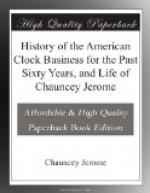his patterns or mode of manufacturing, until he was
driven to it to keep his customers. At the time
when I invented the one-day brass clock in 1838, he
said much against it, that it was not half so good
as a wood clock, and that he never would take up any
thing again that Jerome had adopted; but he was compelled
to, in a year or two, to keep his customers. He
sent his foreman over to Bristol, where I was then
carrying on business, to get patterns of movements
and cases and take all the advantage he could of my
experience, labors, and improvements which I had been
studying upon so long. I allowed my foreman to
spend more than two days with his, giving him all
the knowledge and insight he could of the business,
knowing what his object was. A friend asked me
why I was doing this, and said that if I should send
my man to Thomas’ factory he would be kicked
out immediately. I told him I knew that perfectly
well, but that if Mr. Thomas set out to get into the
business, he certainly would find out, and that the
course I was taking was wisest and more friendly.
I have thought since how quickly such kind treatment
as I showed towards his man can be forgotten; yes;
this company have all forgotten the service that I
rendered them twenty years ago, and as I have said
before, would probably have been making the old wood
clock to this day, had it not been for other parties.
There always has been a great deal of jealousy among
the Yankee clock-makers, and they all seemed to hate
the one who took the lead. The next establishment
of which I shall speak, is that of William L. Gilbert,
of Winsted, Connecticut. He is said to be miserly
in feeling, and is quite rich; not very enterprising,
but has made a great deal of money by availing himself
of the improvements of others.
The next one in the business to whom I shall allude
is E.N. Welch, of Bristol, Connecticut.
He is about fifty years of age, and has been in many
kinds of business. He was deeply interested in
the failure of J.C. Brown a few years ago, and
succeeded him in the clock business. He is a
leading man in the Baptist church, and has a great
tact for making money; but he says that all he wants
of money is to do good with it. He is a Democrat
in politics, and never wants an office from his party.
These five companies which I have named, make nearly
all of the clocks manufactured in Connecticut; though
movements are made by three other companies.
Beach and Hubbell of Bristol, are largely engaged in
manufacturing the movements of brass marine clocks.
Also two brothers by the name of Manross, in Bristol,
are engaged in the same business. Noah Pomeroy
of Bristol, is also engaged in making pendulum movements
for other parties. I should, however, mention
Ireneus Atkins, of Bristol, who is making a first-rate
thirty-day brass clock, and I am told there is no
better one for time in the country. The movement
for this kind of clock was invented by Joseph Ives,
who has spent most of his time for the last twenty-five




